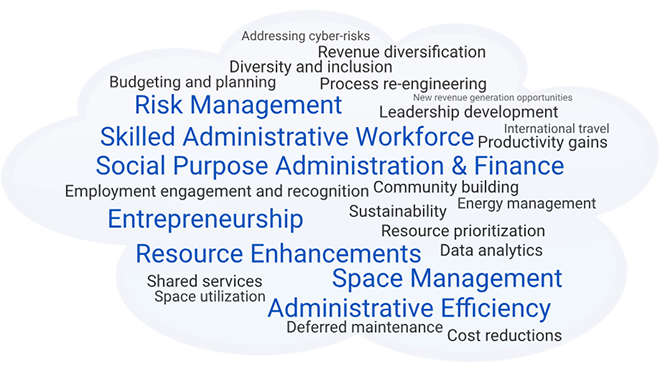Coro’s Blog: On Purpose
Future Shock: Is Higher Education Ready for the Impact?
Published on November 30, 2018

Industries, companies and governments are retooling for the future, driven by the sustainability imperatives of climate change, resource, food and water scarcity, social polarization and rising income inequality.
Universities and colleges are no exception. The future will be won by organizations that were proactive, not those that defended the status quo. As with other industries, the post-secondary sector is undergoing a transition as it explores its reason for existence. Does it equip students and professionals for future roles? Yes. Does it also equip its administrators to contribute their expertise, resources, assets and investments to contribute to societal outcomes? Slowly but surely.
The McConnell Foundation and the Canadian Association of University Business Officers (CAUBO) have been piloting measures to accelerate and scale the role of university administrators in mobilizing their teams to put society on a sustainable path. This is altogether different from – and in addition to – post-secondary institutions contributing to social betterment through their core mandates of teaching and research.
Concrete examples? There is McMaster University in Hamilton, Ontario, whose Facility Services division “gives back” by hosting an annual community day of service where facility employees learn about community organizations through volunteer work. There is Acadia University in Nova Scotia which recently inked a unique Memorandum of Understanding with its host town, Wolfville, committing to leverage collective assets and infrastructure for shared events, procurements, recreational programming, technology services, integrated strategic and business planning and neighbourhood livability.
Those two examples are not the only ones: administration and finance departments in college and university institutions across Canada are mobilizing to play a central role in community well-being. Indeed, here is a just-released inventory of over 60 “for good” administrative practices!
This effort is not without its pressures. Research conducted by McConnell and CAUBO shows that the barriers include:
- Lack of an institutional mandate or direction
- Time and resource constraints
- Entrenched systems and mindsets
- Lack of knowledge of practical examples
- Need for pathways to work with community, teaching and research partners.
Most would be familiar with service learning and community-engaged research in which the academic mandate has evolved to embed community experience in the student and faculty experience. However, administration departments (in addition to academic and research departments) are now also expected to raise their game.
The Social Purpose Administration and Finance project defines social administration and finance as:
- Integrating social and environmental objectives into administration and finance functions, roles, decisions, and behaviours to benefit the institution, students and communities
- Harnessing administration and finance tools, assets, resources and relationships to innovate, accelerate and scale social impact
- Aligning job purpose with social purpose, where all administrative jobs have more purpose and contribute to social impact.
The markers of this progress include:
- Simon Fraser University and the McConnell Foundation commissioned a discussion paper in spring 2017 on the role of post-secondary institutions in unlocking their assets for social betterment – it’s a call to action to universities and colleges to reimagine their role in society
- CAUBO and the McConnell Foundation have partnered to mobilize administration and finance departments for social good, as set out in this winter 2017 briefing paper
- These two organizations are collaborating on a professional development program, including profiling best practices, conducting a webinar series and educating administrators on community partnerships (2018-2019)
- CAUBO recently included Social Purpose Administration and Finance among the criteria for its annual Quality and Productivity Award. (Refer institutions you know here; deadline is Jan. 23 2019.)
While good practices abound, this effort intends to scale and accelerate social progress beyond ad hoc and incremental measures through new uses of administration and finance assets and instruments. Notably, a recent survey of administrators reveals they are most interested in strategic planning for social impact, sustainable behaviour change, and external partnerships and collaboration with community organizations. Addressing these gaps is expected to unlock social innovation and impact directly through finance and administration departments across Canada.
The road ahead is clear, though unpaved. CAUBO recently published a thoughtful article on the roadmap, providing insights into the state of play. Higher education can have even more of an impact “on the ground” in communities by redefining its purpose so that all the institution’s assets are mobilized for social good. Take a look down that road: what do you see?
Browse By Category
Browse blog posts by category below, or return to the main blog page to search or browse by keyword.
Subscribe to Coro’s Newsletter
A few times a year, Strandberg Consulting sends out a newsletter to keep Coro’s network up-to-date on her latest projects, publications and tools. You may subscribe to the newsletter here or visit the archives.



